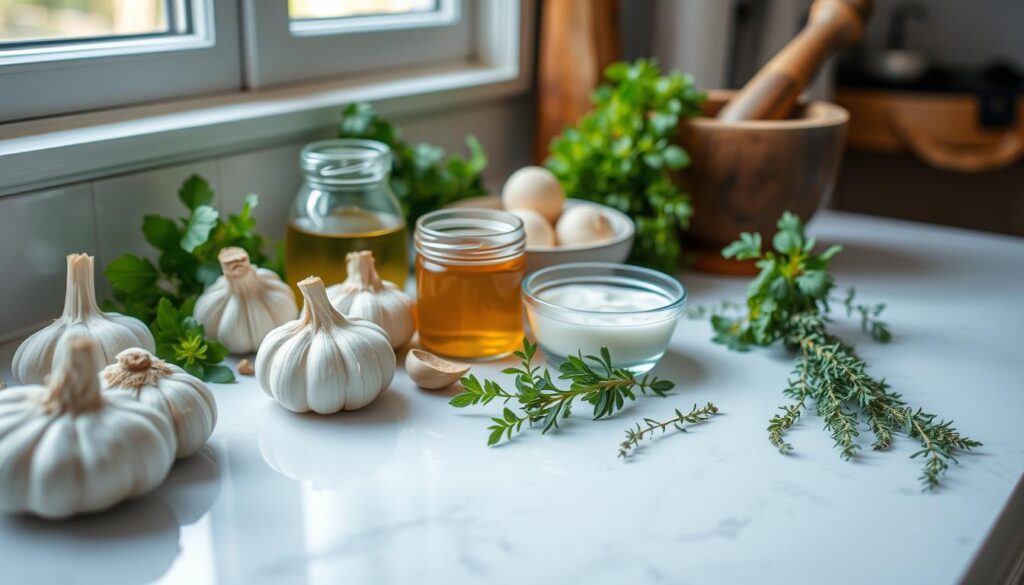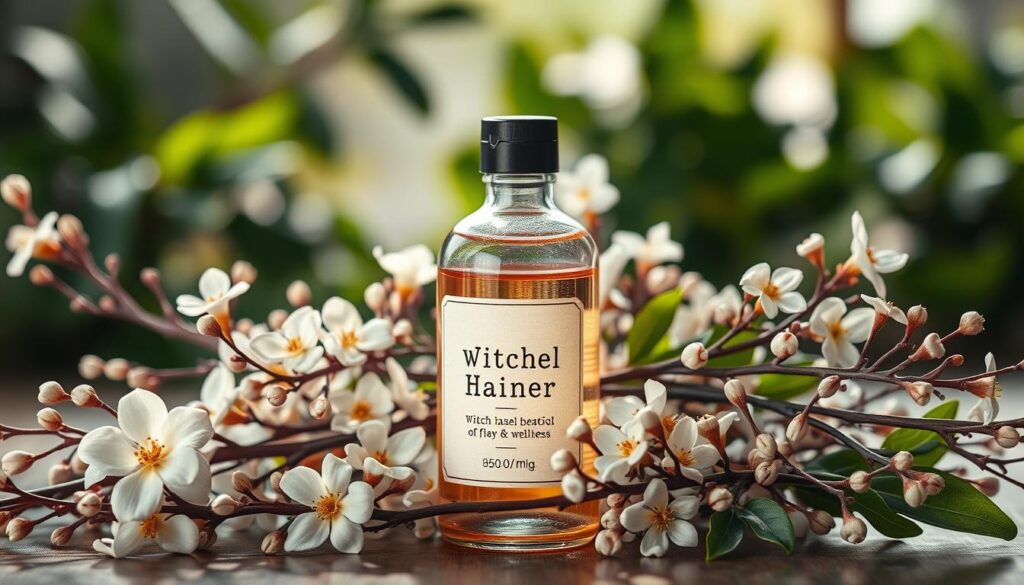Are you tired of dealing with the discomfort and frustration of recurrent yeast infections? If so, you’re not alone. Yeast infections are a common issue that affects many women. Finding effective, natural solutions can be a game-changer.
One natural remedy that has gained attention is witch hazel. But does it really work, and how do you use it effectively? This comprehensive guide will explore the science behind witch hazel and its role in treating yeast infections. We’ll also look at other natural remedies and preventive measures you can consider.
Key Takeaways
- Witch hazel is a natural astringent that may have anti-inflammatory and antimicrobial properties, making it a potential remedy for yeast infections.
- Yeast infections are caused by an overgrowth of the Candida albicans fungus and can lead to uncomfortable symptoms like itching, burning, and discharge.
- Natural treatments like apple cider vinegar, probiotics, and tea tree oil may also help manage yeast infections, but it’s important to consult a healthcare provider for persistent or severe cases.
- Preventive measures such as keeping the genital area clean and dry, avoiding irritants, and maintaining a healthy immune system can help reduce the risk of yeast infections.
- If you experience recurrent yeast infections, it’s important to work with your healthcare provider to identify and address the underlying causes.
Understanding Yeast Infections and Their Common Symptoms
Vaginal yeast infections are common, affecting up to 75% of people with vaginas at least once. These infections are caused by too much Candida albicans fungus. They can cause uncomfortable symptoms that need medical help.
Common Signs and Symptoms to Watch For
Signs of a vaginal yeast infection include severe itching and burning. You might also see a thick, white discharge that looks like cottage cheese. The area may become red and swollen.
Pain when you pee or have sex is another symptom. These symptoms can be very uncomfortable.
Risk Factors and Causes
Many things can cause yeast infections. Antibiotics, hormonal changes, and a weak immune system are some. Lifestyle choices also play a role.
About 45% of people with vaginas get two or more yeast infections. Bacterial vaginosis affects one-third of them. UTIs are also common, causing symptoms like red or pink urine.
When to Seek Medical Attention
Some yeast infections go away on their own. But, if symptoms don’t get better or get worse, see a doctor. Fever or unusual discharge are signs to watch for.
Getting the right diagnosis is key. It helps treat the infection and other health issues.
| Symptom | Percentage of Individuals Affected |
|---|---|
| Vaginal yeast infection (lifetime) | Up to 75% |
| Recurrent vaginal yeast infections | Around 45% |
| Bacterial vaginosis | Approximately 33% |
“While yeast infections become less common with age, postmenopausal individuals may experience symptoms like vaginal irritation possibly due to low estrogen levels.”
Does Witch Hazel Help With Yeast Infections: Scientific Evidence
Witch hazel is known for its anti-inflammatory effects. But, there’s not much scientific proof it helps with yeast infections. Still, some studies hint it might help by soothing irritation and reducing inflammation.
One study showed witch hazel extract could cut skin inflammation by 27%. It also found witch hazel’s tannins fight viruses like the flu and herpes.
Remember, witch hazel isn’t a proven cure for yeast infections. It shouldn’t replace treatments doctors recommend. More research is needed to understand its role in treating yeast infections.
Yet, witch hazel’s antifungal properties and soothing effects might make it a good addition to medical treatments. Always talk to a healthcare provider before using witch hazel in your traditional herbal medicine routine.
| Study | Findings |
|---|---|
| Study on the composition of the volatile fraction of Hamamelis virginiana | Reported in a study: 64(3):251-258. |
| The efficacy of Prrrikweg gel in treating insect bites | Double-blind, placebo-controlled clinical trial, Pharm World Sci 1996; 18(1):35-41. |
| Hamamelis lotion shows anti-inflammatory effects | In a UVB erythema test, Dermatology 1998; 196(3):316-322. |
| Topical preparations with 10% hamamelis distillate | Exhibit anti-inflammatory efficacy in a UV erythema test, Skin Pharmacol.Appl.Skin Physiol 2002; 15(2):125-132. |
These studies suggest witch hazel’s antifungal properties and soothing effects could be beneficial. But, more research is needed to confirm its effectiveness in treating yeast infections.
Natural Remedies and Treatment Options
Many people use over-the-counter treatments for yeast infections. But, some also look for natural remedies. These home remedies can help with symptoms and treat the cause.
Over-the-Counter Solutions
Antifungal creams, suppositories, and pills are common treatments. They have ingredients like tioconazole, miconazole, or clotrimazole. These can clear up mild to moderate infections in a week.
It’s key to use these treatments as directed. This ensures the infection is fully treated.
Complementary Natural Treatments
- Probiotics: Yogurt or probiotic supplements can help balance good bacteria. This fights Candida yeast overgrowth.
- Coconut oil: Its antifungal properties make it a popular choice. It can be used on the skin or taken inside.
- Tea tree oil: It has antimicrobial effects. But, use it carefully and don’t drink it.
- Apple cider vinegar: It can help balance the vagina’s pH. Use it in sitz baths or as a douche.
Proper Application Methods
It’s important to apply treatments correctly. Clean the area before using creams or ointments. For suppositories, lie down after use to let them absorb.
Always talk to a doctor if you’re unsure or if symptoms don’t go away.

Knowing about treatments helps people choose the best option. This way, they can find relief from yeast infection symptoms.
Introducing Smoketree’s APHRODITE’S MELODY TONER
Discover the power of natural skincare with Smoketree’s APHRODITE’S MELODY TONER. This refreshing face mist combines witch hazel with rose petals, calendula, and bergamot.
This toner is made with the best natural ingredients. It’s gentle yet effective for your skin. Witch hazel, a natural remedy, makes it a great addition to your skincare.
The APHRODITE’S MELODY TONER is for overall facial care. Witch hazel’s anti-inflammatory properties may soothe skin conditions. But, it’s not for treating yeast infections.
Enhance your skincare with Smoketree’s APHRODITE’S MELODY TONER. Enjoy its aroma and nourishing effects. This natural witch hazel toner is infused with botanical extracts.

“This toner has become an integral part of my daily skincare routine. It leaves my skin feeling refreshed, balanced, and radiant.”
– Sarah, Satisfied Smoketree Customer
Try natural skincare products like Smoketree’s APHRODITE’S MELODY TONER. It’s a versatile and nourishing face mist for glowing, healthy-looking skin.
Conclusion
Witch hazel might help with yeast infection symptoms, but it’s not enough on its own. To really manage yeast infection prevention and keep your vaginal health in check, you need a few things. You need a proper diagnosis, the right antifungal treatments, and some preventive steps.
Keeping your vaginal health up means staying clean, wearing clothes that breathe, and handling any risks you might have. If your symptoms don’t go away or get worse, see a doctor. They can help you get the right treatment and avoid bigger problems.
It’s important to keep your vaginal flora balanced and tackle the real causes of yeast infections. This way, you can find lasting relief and stop infections from coming back. By focusing on yeast infection prevention and vaginal health maintenance in a big way, you can take back control of your intimate health.

